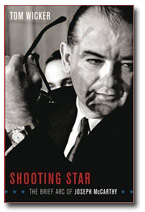Books |
Shooting Star: The Brief Arc of Joe McCarthy
Tom Wicker
By
Published: Oct 28, 2019
Category:
Biography
How many Communists did he have on that famous "list" he had?
"McCarthyism." That’s the catch-all, one-phrase description of the phenomenon he created in his brief — five year — run as the most feared politician in America. Tom Wicker, one of the greater New York Times reporters of the last half century, brings us the life and significance of Joe McCarthy in less than 200 large-print pages. It’s a terrific primer for those who know just enough about McCarthy to realize they know almost nothing. And even those who think they know the McCarthy story will be stunned and enlightened. For this is the story of a small-town boy from Wisconsin with a work ethic to hold up as an example. And then it is the story of a man who — almost by accident, it seems — exploited fears that he couldn’t control, found they brought him fame, and didn’t know when to quit. [To buy the book from Amazon, click here.]
Fame came to him after a speech he made on February 9, 1950, in Wheeling, West Virginia: "I have in my hand a list of 205 Communists… still working and shaping policy in the State Department." That shocking revelation was nothing new — a young politician named Richard Nixon had pretty much covered this territory.
But putting a number in the accusation and "I have here in my hand" did the trick. As Wicker notes, back then, Americans weren’t used to losing… anything. We beat the Germans. We beat the Japanese. But now the Russians were taking over chunks of Europe. And the Russians had the atomic bomb. Such blows to America, Wicker writes, "could only result from subversion, espionage by the evil empire, and treason — betrayal in high places."
Wicker takes the trouble to examine McCarthy’s childhood, and, to my surprise, there is absolutely no clue there to the kind of hater and attacker he would become. His childhood was exemplary. By 17, the boy whose family couldn’t afford for him to go to school was a chicken farmer with 2,000 hens and 10,000 broilers. At 21, he completed all the requirements for a high school degree — in 9 months. He went on to college while working 80 hours a week managing gas stations. Law school followed, and a judgeship.
He started in politics as a Democrat; when he switched parties, it was purely an act of convenience. He campaigned hard, with an acquired taste for the nasty, and when he went to Washington, he took what he had learned most recently — in essence, back alley brawling — and applied it to national politics.
You know the saying: If you have a hammer, everything looks like a nail. That was Joe McCarthy after the speech that made him famous — his mission was to root out the Communists in our government. He never found one.
Who stands up to a bully? You will be amazed to read how much Dwight Eisenhower loathed McCarthy. Even J. Edgar Hoover turned against him. At the Senate hearings that ended McCarthy, an unknown lawyer named Joseph Welch exposed the gratuitousness of his cruelty:
“Senator, may we not drop this? We know he belonged to the Lawyers Guild. Let us not assassinate this lad further, Senator. You’ve done enough. Have you no sense of decency, sir? At long last, have you left no sense of decency?”
Robert F. Kennedy — one of few national figures who went to McCarthy’s funeral — described him as “a very complicated character.” Tom Wicker goes beyond the standard point-of-view about McCarthy to tell us why and how he was complicated. And how dangerous a politician who runs his mouth can be.


